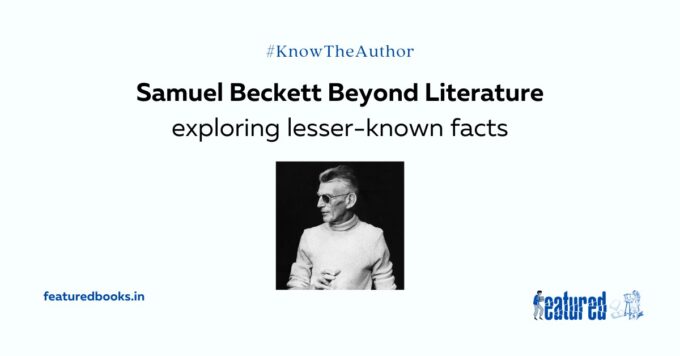Samuel Beckett (1906–1989), the Irish playwright and novelist whose name is synonymous with existential despair and the Theatre of the Absurd, remains one of the most scrutinised figures in 20th-century literature. While his seminal works—Waiting for Godot (1953), Endgame (1957), and the Molloy trilogy (1951–1953)—have been exhaustively analysed, lesser-known dimensions of his life reveal a man of paradoxes: a recluse who revelled in music, a pacifist turned Resistance fighter, and a polyglot whose bilingualism shaped his minimalist aesthetic. This article excavates these understudied facets, arguing that Beckett’s personal experiences, artistic influences, and private struggles are indispensable to understanding his literary innovation. By examining his musicality, wartime heroism, and cinematic inspirations, we uncover a richer portrait of an artist whose life was as textured as his works.
Early Life and Musical Foundations
Born into a middle-class Protestant family in Foxrock, Dublin, Beckett’s upbringing was marked by academic rigour and cultural enrichment. Beyond his literary proclivities, music played a pivotal role in his formative years. Beckett was an accomplished pianist who cultivated a lifelong passion for classical composers like Beethoven and Schubert, whose rhythmic structures permeated his writing. His radio play Words and Music (1962) explicitly intertwines dialogue with musical motifs, reflecting his belief that “music is the idea itself, unaware of the world of phenomena.” This musicality is evident in the cadenced repetitions of Waiting for Godot, where dialogue oscillates between harmony and dissonance, mirroring the cyclical despair of his characters. Such influences challenge the perception of Beckett as solely a literary figure, positioning him instead as an artist who synthesised auditory and textual rhythms.
Wartime Heroism: From Pacifist to Resistance Agent
Beckett’s wartime activities starkly contrast his reputation as an apolitical writer. Though initially neutral due to Irish citizenship, he joined the Gloria SMH Resistance cell in Nazi-occupied Paris, translating intelligence reports and smuggling weapons. Betrayed in 1942, Beckett and his partner Suzanne Dechevaux-Dumesnil fled to Roussillon, a Provençal village, where he continued aiding the Resistance while drafting Watt (1953). His covert contributions earned him the Croix de Guerre in 1949, yet Beckett rarely discussed this period, dismissing it as “boy scout stuff.” This modesty obscures war’s profound impact on his oeuvre: the barren landscapes of Endgame and Happy Days (1961) evoke the desolation of postwar Europe, while themes of surveillance and betrayal in Molloy resonate with his clandestine experiences.
Cinematic Inspirations: Chaplin, Keaton, and the Tramp Archetype
Beckett’s affinity for silent film comedians profoundly shaped his theatrical vision. The tramp personas of Charlie Chaplin and Buster Keaton—marked by physical comedy and existential futility—directly inspired Waiting for Godot’s Vladimir and Estragon. Beckett admired Keaton’s “optical din,” a blend of visual gags and stoic resignation, casting him in Film (1965), a meditation on perception and identity. Similarly, Chaplin’s The Circus (1928) illustrates the cyclical futility of Godot, where waiting becomes a tragicomic ritual. These influences underscore Beckett’s ability to transmute popular culture into high art, bridging vaudeville and existentialism.
Literary Practices: Bilingualism and the Challenge of Translation
Beckett’s decision to write in French—a “language without style”—after 1945 was both a creative constraint and liberation. By abandoning his native English, he stripped his prose of ornamentation, achieving the sparseness emblematic of Molloy and Malone Dies (1951). However, his self-translations reveal deliberate deviations; the English Molloy amplifies linguistic playfulness, while the French text leans into existential bleakness. This bifurcation reflects Beckett’s view of translation as “a journey between two solitudes,” where meaning is perpetually deferred—a metaphor for his characters’ Sisyphean struggles.
Publishing Struggles and the Avant-Garde
Beckett’s early works faced commercial rejection, leading to unconventional publishing choices. Watt, written during his wartime exile, was first published in 1953 by Olympia Press—a press better known for erotic fiction. This alliance with the avant-garde underscored Beckett’s marginal status in postwar literature, yet it also positioned him as a bridge between high modernism and countercultural movements. The novel’s fragmented structure and linguistic absurdities prefigured postmodernism, illustrating Beckett’s role as a literary innovator ahead of his time.
Personal Life: Intimacy, Addiction, and Loss
Behind Beckett’s austere public persona lay a man of contradictions. His heavy drinking, particularly of red wine, was both a social ritual and a coping mechanism. Friends recalled nights where Beckett “drank until dawn, yet wrote with monastic discipline.” Equally poignant was his devotion to family; he rushed to his brother Frank’s bedside during Frank’s terminal illness in 1954, a period of grief that influenced the elegiac tone of Krapp’s Last Tape (1958). These personal struggles humanise Beckett, revealing a figure grappling with mortality long before it dominated his works.
Awards and Legacy: Beyond the Nobel Prize
While the 1969 Nobel Prize cemented Beckett’s global stature, lesser-known accolades like the 1959 Obie Award for Krapp’s Last Tape highlight his impact on experimental theatre. The Obie, awarded for off-Broadway excellence, recognised Beckett’s ability to distil existential angst into minimalist drama, influencing generations of playwrights from Harold Pinter to Caryl Churchill. Conversely, his request for a private burial at Montparnasse Cemetery—beside his wife, Suzanne—epitomised his aversion to public adulation, a testament to his belief that “silence is the only applause an artist needs.”
Interesting Facts About Samuel Beckett
- Musical Talent: Beckett was a skilled pianist with a deep love for classical music, notably Beethoven and Schubert, which influenced the rhythmic structure of his writing.
- Wartime Heroism: He actively participated in the French Resistance during World War II, earning the Croix de Guerre for his efforts.
- Cinematic Influence: Beckett drew inspiration from silent film stars like Buster Keaton and Charlie Chaplin, whose tramp characters influenced Waiting for Godot.
- Unconventional Publishing: His novel Watt was first published by Olympia Press, a publisher known for avant-garde and erotic works.
- Heavy Drinker: Beckett was known for his heavy drinking, often staying up until the early hours of the morning with friends.
- Literary Mentor: He greatly admired James Joyce and assisted with the research for Finnegans Wake.
- Bilingual Writer: Beckett wrote many of his works in French first, then translated them into English, often with significant differences.
- Family Bonds: He shared a close relationship with his brother Frank, whom he cared for during Frank’s final illness.
- Obie Award Winner: Beckett won the 1959 Obie Award for Krapp’s Last Tape, a lesser-known but significant accolade.
- Private Burial: He was buried in a private ceremony at Montparnasse Cemetery in Paris, reflecting his lifelong preference for privacy.
Beckett in His Own Words: Quotes Reflecting His Life
Beckett’s writings often mirrored his philosophy and experiences. Here are some quotes that resonate with his life:
- On Waiting and Persistence:
“Nothing happens. Nobody comes, nobody goes. It’s awful.” – Waiting for Godot
This line encapsulates Beckett’s exploration of existential waiting, a theme that mirrored his own wartime experiences and personal struggles. - On Silence and Solitude:
“Silence is the only applause an artist needs.”
Beckett’s preference for privacy and his disdain for public acclaim are reflected in this sentiment. - On Mortality and Loss:
“They give birth astride of a grave, the light gleams an instant, then it’s night once more.” – Waiting for Godot
This haunting reflection on the brevity of life echoes Beckett’s personal encounters with death, including the loss of his brother Frank. - On the Human Condition:
“Ever tried. Ever failed. No matter. Try again. Fail again. Fail better.” – Worstward Ho
This quote, often cited as Beckett’s life motto, reflects his resilience in the face of personal and professional adversity. - On Art and Creation:
“To find a form that accommodates the mess, that is the task of the artist now.”
This statement encapsulates Beckett’s commitment to minimalist forms and existential themes and also reflects his bilingual writing process.
Conclusion
Samuel Beckett’s legacy transcends the bleak landscapes of his plays. By examining his musicality, wartime resilience, and cinematic inspirations, we uncover a polymath whose life was as layered as his literature. These lesser-known facets do not merely supplement his biography; they illuminate the symbiotic relationship between his lived experiences and artistic output. Beckett’s genius lies not only in his exploration of existential voids but in his ability to infuse those voids with the echoes of music, the shadows of war, and the flicker of silent film. He crafted a body of work that remains as enigmatic and enduring as the man himself.
Vyom for Featured Books





